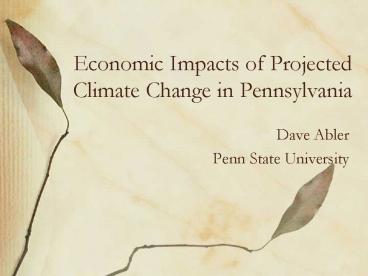Economic Impacts of Projected Climate Change in Pennsylvania
1 / 21
Title:
Economic Impacts of Projected Climate Change in Pennsylvania
Description:
... energy, human health, property and insurance, recreation and tourism, ... computer-based model General: the model covers the entire PA economy, ... –
Number of Views:92
Avg rating:3.0/5.0
Title: Economic Impacts of Projected Climate Change in Pennsylvania
1
Economic Impacts of Projected Climate Change in
Pennsylvania
- Dave Abler
- Penn State University
2
The Research Team
- Team leader Jim Shortle (Penn State)
- Team members Dave Abler, Karen Fisher-Vanden,
Marc McDill, Rich Ready, and Tom Wilson (all Penn
State), and Ian Sue Wing (Boston University)
3
We Were Asked by DEP to
- Develop quantitative estimates of potential
impacts of projected climate change on
Pennsylvania economy - Sectors of special focus agriculture, forestry,
fisheries, energy, human health, property and
insurance, recreation and tourism, and commerce
and industry at large
4
Our Methodology
- Develop a dynamic computable general equilibrium
(CGE) model of the Pennsylvania economy - Use the model to project the PA economy to 2050,
first without climate change (baseline) and then
with climate change (scenario) - The impact of climate change difference between
baseline and scenario
5
What Is a Dynamic CGE Model?
- Dynamic traces the path of the PA economy on an
annual basis to 2050 - Computable computer-based model
- General the model covers the entire PA economy,
with the economy divided into 32 sectors - Equilibrium businesses, households, and markets
adjust and adapt to economic changes
6
Strengths of Our Approach
- Dynamic CGE models represent the state of the art
in economic modeling of climate change impacts - Our study is the only state-level study of
climate change impacts to date that uses a
dynamic CGE model
7
Our Approach Captures Climate Change Impacts on
- Productivity and production costs in
climate-sensitive sectors of the PA economy - Demand for goods produced in climate-sensitive
sectors of the PA economy - Labor supply and productivity in PA
- Property losses in PA
- PA government revenues
8
Our Approach Also Captures
- General equilibrium impacts on PA sectors not
directly affected by climate change - Multiplier impacts on PA personal income
- Impacts on PA economy due to effects of climate
change on the rest-of-US and rest-of-world
economies
9
Climate Change in Other Places and the
Pennsylvania Economy
- PA businesses compete with businesses in other
states and countries - PA businesses and households purchase goods from
other states and countries - PA businesses and households borrow and invest in
other states and countries - People migrate into and out of Pennsylvania
10
Dynamic CGE Model Results
- This presentation will discuss the model results
for 2050 for Pennsylvanias - Agriculture
- Forestry
- Energy
- Economy as a whole
- Other results are presented and discussed in our
report
11
Agriculture Results
- Grains, oilseeds, fruits and vegetables
- Climate change increases productivity and
production in PA - Climate change also increases productivity in
other states, lowering prices received by PA
farmers - Net result small changes in revenues for PA
grain and oilseed farmers, revenues increase for
fruit and vegetable farmers
12
Agriculture Results (continued)
- Beef, dairy, poultry, eggs, and hogs
- Climate change reduces PA productivity
- Climate change reduces productivity even more in
other states - Net result climate change gives PA livestock
farmers a competitive advantage relative to other
states, shifting production from other states to
PA
13
Agriculture Results (continued)
- Food processing
- Changes in agricultural production and prices
affect PA food processing sector - PA food processing output increases, as some
production shifts from other states to PA
14
Forestry Results
- Two scenarios, optimistic and pessimistic
- Optimistic scenario climate change increases
forest productivity because of longer growing
seasons, higher temperatures, more rainfall, etc. - Pessimistic scenario rapid dieback of existing
northern species reduces PA productivity, until
PA rebuilds its forestry sector with more
southern species
15
Forestry Results (continued)
- Optimistic scenario
- Climate change increases productivity in PA,
increasing PA forestry and wood products
manufacturing production - Productivity in other states also increases,
reducing prices received by PA producers - Net result revenues for forestry producers
increase, basically no change in wood products
revenues
16
Forestry Results (continued)
- Pessimistic scenario
- Climate change reduces productivity in PA but
increases productivity elsewhere - Production and prices received by PA forestry
producers both fall - PA wood products manufacturers hold their own,
using more wood from other states
17
Energy Results
- Climate change leads to lower heating demand in
winter but higher air conditioning demand in
summer - Net result an increase in annual electricity
demand of 2 in 2050 - Increase in electricity demand leads to slight
increases in energy prices (0-1)
18
Energy Results (continued)
- Higher energy prices increase costs of production
in energy-using sectors, leading to very slight
reductions in production (all less than 0.3) - No discernible change in overall consumer and
producer prices
19
Economy-Wide Results
- Impact of climate change on Pennsylvanias gross
state product (GSP) is very small, less than 0.1
either way - Impact on overall consumer and producer prices is
very small, about a 0.2 increase - Changes in total consumption expenditures,
investment, and government revenues are also very
small
20
Economy-Wide Results (continued)
- Why are the aggregate impacts small?
- The impacts of climate change on
climate-sensitive sectors are mixed, with some
negatives and some positives - Pennsylvania has a large and diverse economy,
shielding it from major changes in any one sector
21
Conclusions
- Climate change presents challenges and
opportunities for Pennsylvanias economy - The sectors most affected by climate change are
agriculture, food processing, forestry, wood
products, and energy - Impacts of climate change on the Pennsylvania
economy as a whole are likely to be small































